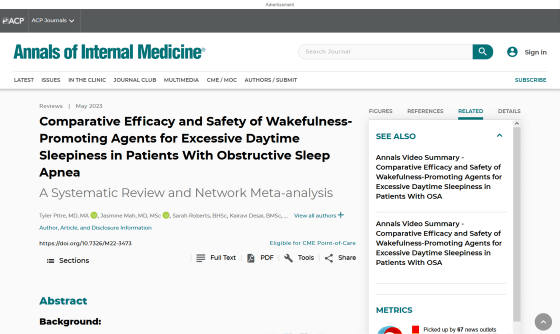Scientists identify 'drugs that are not caffeine' that help relieve daytime sleepiness

Many people have suffered from daytime sleepiness, but
Comparative Efficacy and Safety of Wakefulness-Promoting Agents for Excessive Daytime Sleepiness in Patients With Obstructive Sleep Apnea: A Systematic Review and Network Meta-analysis
https://doi.org/10.7326/M22-3473

McMaster researchers find best treatment for excessive daytime sleepiness – Brighter World
https://brighterworld.mcmaster.ca/articles/mcmaster-researchers-find-best-treatment-for-excessive-daytime-sleepiness/
Scientists Found a Drug That Relieves Daytime Sleepiness – And It's Not Caffeine : ScienceAlert
https://www.sciencealert.com/scientists-found-a-drug-that-relieves-daytime-sleepiness-and-its-not-caffeine
OSA is a disease in which the upper airway is completely blocked due to factors such as obesity and a small jaw, and breathing stops frequently during sleep. Common symptoms include loud snoring and frequent awakenings during sleep, and recent studies have also shown that EDS has a significant negative impact on quality of life and cognitive decline .
Tyler Pitre, a resident physician at McMaster University and lead author of the paper, said 15 to 30 percent of people in North America may have OSA. “Many of them have EDS, which affects their quality of life, reduces their productivity, and puts them at risk for other mental health problems,” he said. Improving is the most important thing for doctors.'

Therefore, Pitre et al.'s research team reviewed 14 clinical trials involving 3085 people with OSA and EDS, and investigated the effectiveness of three anti-fatigue drugs:
The analysis confirmed that all three anti-fatigue drugs were more effective than placebo in reducing EDS, albeit to varying degrees. In addition, among the three drugs, soluriamfettle had the highest stimulant effect, and although soluriamfettle and armodafinil also had side effects, armodafinil was more likely to cause side effects and cause patients to stop taking it. was also found to be high.
It is difficult to summarize findings across multiple clinical trials, but solurium fettle reduces EDS by increasing levels of noradrenaline , which is important for movement, and dopamine , which is involved in motor control and motivation, in the brain. It is believed to be effective.
Future studies should examine the effects of long-term soluriamfettle use, as soluriamfettle can increase blood pressure as a side effect and few effects have been identified for long-term use. It is said that there is

The research team believes that these anti-fatigue drugs not only help improve EDS, but are also effective in treating patients with chronic fatigue syndrome and long COVID, who experience fatigue that interferes with their daily lives. I think that there is a nature.
``It will be interesting to know how effective these anti-fatigue drugs are in treating chronic fatigue syndrome and related conditions such as long-term COVID,'' said co-author and anesthesiologist Dena Zeraatkar. I was.
Related Posts:
in Science, Posted by log1h_ik







